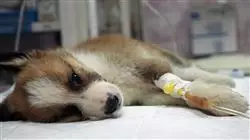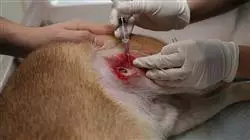University certificate
The world's largest faculty of pharmacy”
Introduction to the Program
Advance your skills and keep up to date with all the latest developments in pharmacological approaches in this particular area of use”

This specialization will lead the student to the most complete learning of the main pharmacological properties of the groups of drugs capable of modifying body functions that interfere with their autonomic regulation. For this purpose, the main pharmacological properties, mechanisms of action, pharmacokinetics, and therapeutic and toxic effects of the groups of drugs that act on the central nervous system and other systems of the animal organism are determined in this training.
Due to their complexity, the mechanisms by which various drugs act on the Central Nervous System are not always well understood. These drugs with effects on the Central Nervous System act on specific receptors that regulate synaptic transmission.
This Postgraduate diploma examines the main pharmacological properties (mechanism of action, pharmacokinetics, and therapeutic and toxic effects) of groups of drugs that act on the cardiovascular, respiratory, renal and blood systems. Classifies the different drugs that act at the vascular level, such as coagulation modifiers, and cardiac drugs. It examines the different drugs that act as respiratory stimulants, bronchodilators, expectorants and antitussives. It also deals with the pharmacology of the digestive system, both at the level of secretion and motility, laxative and antidiarrheal drugs, as well as pharmacology of vomiting. Finally, it establishes the drugs used for the treatment of a wide variety of neurological and psychiatric diseases, analgesics, among other symptoms; and offers specialized knowledge on the different drugs that act on the motility of the stomach and its secretions, as well as drugs that act on the gastric pH, on the intestinal tract and on the motility of the rumen-reticulum.
The program includes practical activities to facilitate students’ acquisition and mastery of the theory learned, supporting and complementing the knowledge acquired in the theoretical teaching. The contents are presented to the professional in an attractive and dynamic way in multimedia packages that include videos, images and diagrams in order to reinforce knowledge.
Thanks to its innovative teaching methodology, it allows the student to follow its contents in a totally flexible and personalized way, with great availability on the part of the teachers for consultations, doubts or tutorials.
Improving your skills in a sector with a high demand for professionals will boost both your professional and personal career”
This Postgraduate diploma in Systemic Veterinary Pharmacology contains the most complete and up-to-date scientific program on the market. The most important features of the program include:
- Practical cases presented by experts in Veterinary Pharmacology
- The graphic, schematic, and eminently practical contents with which they are created, provide scientific and practical information on the disciplines that are essential for professional practice
- Practical exercises where self-assessment can be used to improve learning
- Its special emphasis on innovative methodologies
- Theoretical lessons, questions to the expert, debate forums on controversial topics, and individual reflection assignments
- Content that is accessible from any fixed or portable device with an Internet connection
Succeed with the best and acquire the knowledge and skills you need to embark on the veterinary pharmacology industry"
The program’s teaching staff includes professionals from sector who contribute their work experience to this training program, as well as renowned specialists from leading societies and prestigious universities.
The multimedia content, developed with the latest educational technology, will provide the professional with situated and contextual learning, i.e., a simulated environment that will provide immersive training programmed to train in real situations.
This program is designed around Problem Based Learning, whereby the professional must try to solve the different professional practice situations that arise during the academic year. For this purpose, the student will be assisted by an innovative interactive video system created by renowned and experienced experts.
Get up to date on the use of systemic drugs in the veterinary field for the prevention and treatment of diseases affecting animal health"

Specialize in Systemic Veterinary Pharmacology through a revolutionary training for its teaching and content quality, and its intensive and flexible approach at the same time.
Why study at TECH?
TECH is the world’s largest online university. With an impressive catalog of more than 14,000 university programs available in 11 languages, it is positioned as a leader in employability, with a 99% job placement rate. In addition, it relies on an enormous faculty of more than 6,000 professors of the highest international renown.

Study at the world's largest online university and guarantee your professional success. The future starts at TECH”
The world’s best online university according to FORBES
The prestigious Forbes magazine, specialized in business and finance, has highlighted TECH as “the world's best online university” This is what they have recently stated in an article in their digital edition in which they echo the success story of this institution, “thanks to the academic offer it provides, the selection of its teaching staff, and an innovative learning method aimed at educating the professionals of the future”
A revolutionary study method, a cutting-edge faculty and a practical focus: the key to TECH's success.
The most complete study plans on the university scene
TECH offers the most complete study plans on the university scene, with syllabuses that cover fundamental concepts and, at the same time, the main scientific advances in their specific scientific areas. In addition, these programs are continuously being updated to guarantee students the academic vanguard and the most in-demand professional skills. In this way, the university's qualifications provide its graduates with a significant advantage to propel their careers to success.
TECH offers the most comprehensive and intensive study plans on the current university scene.
A world-class teaching staff
TECH's teaching staff is made up of more than 6,000 professors with the highest international recognition. Professors, researchers and top executives of multinational companies, including Isaiah Covington, performance coach of the Boston Celtics; Magda Romanska, principal investigator at Harvard MetaLAB; Ignacio Wistumba, chairman of the department of translational molecular pathology at MD Anderson Cancer Center; and D.W. Pine, creative director of TIME magazine, among others.
Internationally renowned experts, specialized in different branches of Health, Technology, Communication and Business, form part of the TECH faculty.
A unique learning method
TECH is the first university to use Relearning in all its programs. It is the best online learning methodology, accredited with international teaching quality certifications, provided by prestigious educational agencies. In addition, this disruptive educational model is complemented with the “Case Method”, thereby setting up a unique online teaching strategy. Innovative teaching resources are also implemented, including detailed videos, infographics and interactive summaries.
TECH combines Relearning and the Case Method in all its university programs to guarantee excellent theoretical and practical learning, studying whenever and wherever you want.
The world's largest online university
TECH is the world’s largest online university. We are the largest educational institution, with the best and widest online educational catalog, one hundred percent online and covering the vast majority of areas of knowledge. We offer a large selection of our own degrees and accredited online undergraduate and postgraduate degrees. In total, more than 14,000 university degrees, in eleven different languages, make us the largest educational largest in the world.
TECH has the world's most extensive catalog of academic and official programs, available in more than 11 languages.
Google Premier Partner
The American technology giant has awarded TECH the Google Google Premier Partner badge. This award, which is only available to 3% of the world's companies, highlights the efficient, flexible and tailored experience that this university provides to students. The recognition as a Google Premier Partner not only accredits the maximum rigor, performance and investment in TECH's digital infrastructures, but also places this university as one of the world's leading technology companies.
Google has positioned TECH in the top 3% of the world's most important technology companies by awarding it its Google Premier Partner badge.
The official online university of the NBA
TECH is the official online university of the NBA. Thanks to our agreement with the biggest league in basketball, we offer our students exclusive university programs, as well as a wide variety of educational resources focused on the business of the league and other areas of the sports industry. Each program is made up of a uniquely designed syllabus and features exceptional guest hosts: professionals with a distinguished sports background who will offer their expertise on the most relevant topics.
TECH has been selected by the NBA, the world's top basketball league, as its official online university.
The top-rated university by its students
Students have positioned TECH as the world's top-rated university on the main review websites, with a highest rating of 4.9 out of 5, obtained from more than 1,000 reviews. These results consolidate TECH as the benchmark university institution at an international level, reflecting the excellence and positive impact of its educational model.” reflecting the excellence and positive impact of its educational model.”
TECH is the world’s top-rated university by its students.
Leaders in employability
TECH has managed to become the leading university in employability. 99% of its students obtain jobs in the academic field they have studied, within one year of completing any of the university's programs. A similar number achieve immediate career enhancement. All this thanks to a study methodology that bases its effectiveness on the acquisition of practical skills, which are absolutely necessary for professional development.
99% of TECH graduates find a job within a year of completing their studies.
Postgraduate Diploma in Systemic Veterinary Pharmacology
Systemic veterinary pharmacology is the study of the use of drugs in animals to treat disease and improve their health. This discipline focuses on how drugs interact with the animal's body at the banal level, not just at the level of specific organs or systems. In practice, systemic veterinary pharmacology is used to develop and optimize drug treatments in animals, as well as to evaluate the efficacy and safety of new drugs. Veterinary professionals working in systemic veterinary pharmacology ensure that the drugs prescribed are safe and effective for the type of animal and health problem in question, and that they are dosed and administered appropriately.
It is important to note that systemic veterinary pharmacology deals with medications specifically designed for use in animals. Many times, drugs that work well in humans are not suitable for use in animals due to differences in physiology, metabolism and other factors. Therefore, there is a need for research and development specifically for drug treatments in animals. TECH, the world's largest online university, has an academic program designed to provide students with knowledge and skills in animal pharmacological processes and proper drug administration, so they can identify and treat diseases in animals and avoid adverse drug reactions. Students will learn to apply pharmacological principles in the proper administration of drugs and in the diagnosis and treatment of diseases in animals. They will also learn to identify treatment needs in specific animal species, as well as regulatory requirements and best practices in animal drug administration.







